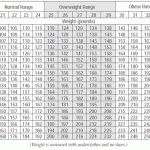 Maintaining a healthy weight is a very important part of preventing chronic disease. Being overweight increases your chances of developing other major health problems that can cause heart disease, such as diabetes, high blood pressure, and high blood cholesterol. Too much weight also increases your chances for stroke, heart failure, gallbladder disease, arthritis, and breathing problems, as well as breast, colon, and other cancers. The bottom line: a healthy weight can help to protect your health – and even save your life.
Maintaining a healthy weight is a very important part of preventing chronic disease. Being overweight increases your chances of developing other major health problems that can cause heart disease, such as diabetes, high blood pressure, and high blood cholesterol. Too much weight also increases your chances for stroke, heart failure, gallbladder disease, arthritis, and breathing problems, as well as breast, colon, and other cancers. The bottom line: a healthy weight can help to protect your health – and even save your life.
ARE YOU AT RISK?
Of one simplest ways to find out if you are at risk for chronic disease is to determine your BMI or Body Mass Index. According to the Centers for Disease Control and Prevention, BMI is an uncomplicated method of assessment for weight and obesity. It is derived from two simple measures: weight and height. The final measurement fits into a particular range of four different categories. These are underweight, normal, overweight and obese. Sometimes an extremely obese category is also used.
SIGNIFICANCE OF BMI
BMI is a used by some insurance companies to determine the health risk of their clients. It is important to understand that BMI is not a clinical diagnostic tool, but it is a way to derive the proclivity of the general health risks associated with a particular weight. Those who fall into the obese or extremely obese categories are on average much more likely than other individuals to develop serious lifelong health problems.
Your weight in relation to your height gives you a number called “body mass index”. Take a look at the chart at the left to help assess your BMI. You can find many calculators online to determine your BMI. There are even BMI calculator apps available for many mobile phones.
WHAT DOES YOUR BMI NUMBER MEAN?
- Under weight: BMI < 18.5. Despite the saying, “You can never be too rich or too thin,” people who have a BMI of less than 18.5 have an increased risk for disease and other health complications.
- Normal weight: BMI of 18.5 – 24.9. Do not gain weight; you are in the normal range and have an average risk for weight related diseases such as heart disease, Diabetes Type II, Stroke, high cholesterol, high triglycerides, etc.
- Overweight: BMI of 25 – 29.9. You are at an increased risk for weight related diseases. Start a weight loss program, especially if your waistline is big. For heart healthy living, your goal is to maintain a normal weight with BMI of 18.5 – 24.9.
- Obesity Degree I: BMI is 30 to 34.9. You are at a high risk for weight related diseases.
- Obesity Degree II: BMI is 35 to 39.9. You are at a very high risk for weight related diseases.
- Obesity Degree II: BMI is 40 or over. You are at a extremely high risk for weight related diseases.
If your BMI is in one of these ranges, Obesity Degree I, Obesity Degree II, or Obesity Degree III, You need to lose weight. It is considered optimum to lose weight slowly – about 1/2 to 2.5 pounds a week. Slow weight loss is healthier than rapid weight loss. It has been proven that slow weight loss is easier to maintain.
CONSIDERATIONS
Muscle is denser than fat, so a BMI calculation can mistake a healthy muscular or athletic individual for an overweight one. It is more accurate to measure body fat directly, which is slightly harder and typically requires an extra device. However, it is worth the trouble because body fat percentage is also a useful measurement for assessing health problems.
OTHER HEALTH FACTORS
BMI is limited in its capacity because it merely measures the appropriate weight for a given height, but a high BMI also tends to correlate with other health factors associated with excess weight. These problems include high blood pressure, and high amounts of triglycerides, LDL, or bad, cholesterol and blood glucose. If you are at all concerned about your health, weight or BMI, please consult your health care professional.
METABOLIC BALANCE HAS BEEN PROVEN TO HELP REDUCE BMI AND IMPROVE HEALTH
A study recently published in the Journal of Nutrition and Metabolism proves that the metabolism program Metabolic Balance® is an extremely effective program for weight loss which also has a positive effect on both health and personal quality of life. Read an abstract of the study.
Metabolic balance® has individualized programs for weight management & optimal health. So you will be confident that you are at a healthy weight, eating the foods that are right for you, and know you are the healthy. If you are interested in finding out more about metabolic balance,® contact Myra. You can also visit MetabolicBalanceCalifornia.com. Sign up for monthly news & tips.
With metabolic balance® it is more about how good you feel than anything else. Metabolic balance® has individualized programs for weight loss, weight gain, weight maintenance & get healthy, and a special program for athletes.
RELATED POSTS
Are You a Healthy Weight?
Myra is Interviewed by Dr. Emmy A. Horstkamp, Metabolic Balance US
How Do I Register For Metabolic Balance?
Copyright © 2012 – , Myra Nissen.
Would you like to include this article in your newsletter or website?
You can as long as you include the following blurb with it:
This article was brought to you by Myra Nissen, CCH, RSHom(NA), Board Certified Classical Homeopath. Myra teaches women how to recognize their body’s unique needs and cues and uses Homeopathy to help empower women to take control of their bodies, health and well-being. Find out more, visit her blog www.myranissen.com/blog.

